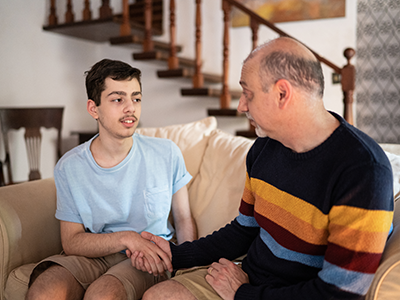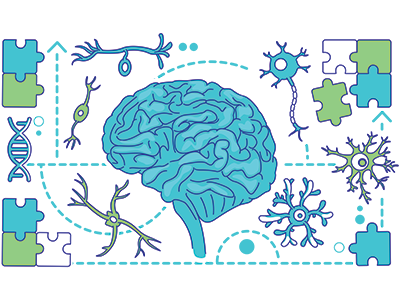It’s well known that children with autism spectrum disorder (ASD) have a higher chance of also being diagnosed with anxiety. At the Center for Autism Spectrum Disorders, we’ve been researching to discover why this association exists so people with autism can get more specialized, targeted treatment if they need it. Our research on autism and anxiety was presented at the International Meeting for Autism Research and indicates that progress in understanding autism and anxiety’s relationship is well underway. The exponential increase of open, public exposure to information about both anxiety and ASD is now quite common and given much more attention in modern society. Below is an overview of some of our recent research findings.
- Children with Autism Spectrum Disorder (ASD) experience more anxiety symptoms and have higher rates of anxiety than their peers.
In typically developing (TD) children, anxiety makes it more difficult for a child to separate themselves from negative stimuli or triggers, whether it’s losing a parent, moving, starting a new school, dealing with an illness or interacting with others. For kids with ASD, these stressors may have an amplified effect, and researchers are still trying to figure out why.
- Executive function (EF) impacts how kids process anxiety.
Executive functions are defined by actions and behaviors that help get things done. EF includes several skills, including the ability to:
- Stop an action or resist reacting to an impulse
- Transition from one task to another flexibly
- Regulate emotional and behavioral responses
- Initiate activities
- Keep track of information
- Plan for the future
- Organize and adapt behavior
ASD is a mixture of social-communication deficits, repetitive behaviors, and restricted interests, and problems in executive function in the areas of flexibility, planning and organization. Kids with ASD may have trouble sustaining conversations, maintaining eye contact, mirroring body language, using their imagination or making friends.
- Flexibility is a larger barrier among kids with ASD than typically developing children.
Kids with ASD have more problems being flexible which puts them at risk for anxiety. Our research demonstrates that parent-reported problems in flexibility are a significant predictor of parent-reported anxiety in children. As such, targeting flexibility and other executive functions during treatment may help to reduce anxiety.
The best way for researchers like us to further identify how anxiety and other disorders impact ASD is to consistently partner with kids with ASD and their families. We can learn about ASD more efficiently and at a deeper level by identifying and understanding the disorder in its entirety. If you’d like to know more or get involved with the Center for Autism Spectrum Disorders, visit our website or give us a call at 301-765-5425.
 https://riseandshine.childrensnational.org/wp-content/uploads/2022/05/Father-and-son-talking-at-home-feature.png
300
400
Rise and Shine
https://riseandshine.childrensnational.org/wp-content/uploads/2017/11/childrens_riseandshine_logo.jpg
Rise and Shine2024-02-12 01:12:352024-02-12 13:58:48Talking to your child about their autism diagnosis
https://riseandshine.childrensnational.org/wp-content/uploads/2022/05/Father-and-son-talking-at-home-feature.png
300
400
Rise and Shine
https://riseandshine.childrensnational.org/wp-content/uploads/2017/11/childrens_riseandshine_logo.jpg
Rise and Shine2024-02-12 01:12:352024-02-12 13:58:48Talking to your child about their autism diagnosis





















Leave a Comment
Want to join the discussion?Feel free to contribute!